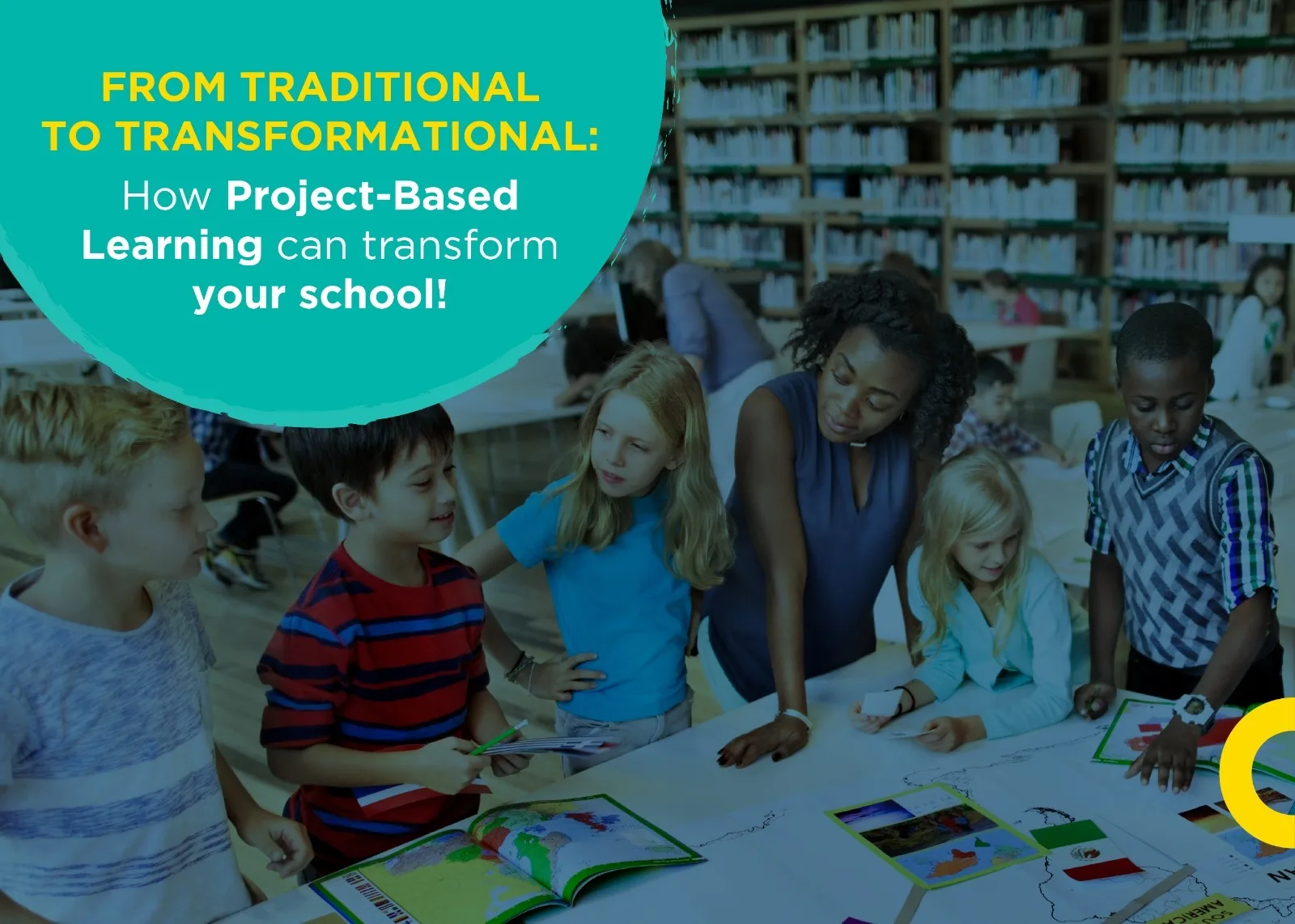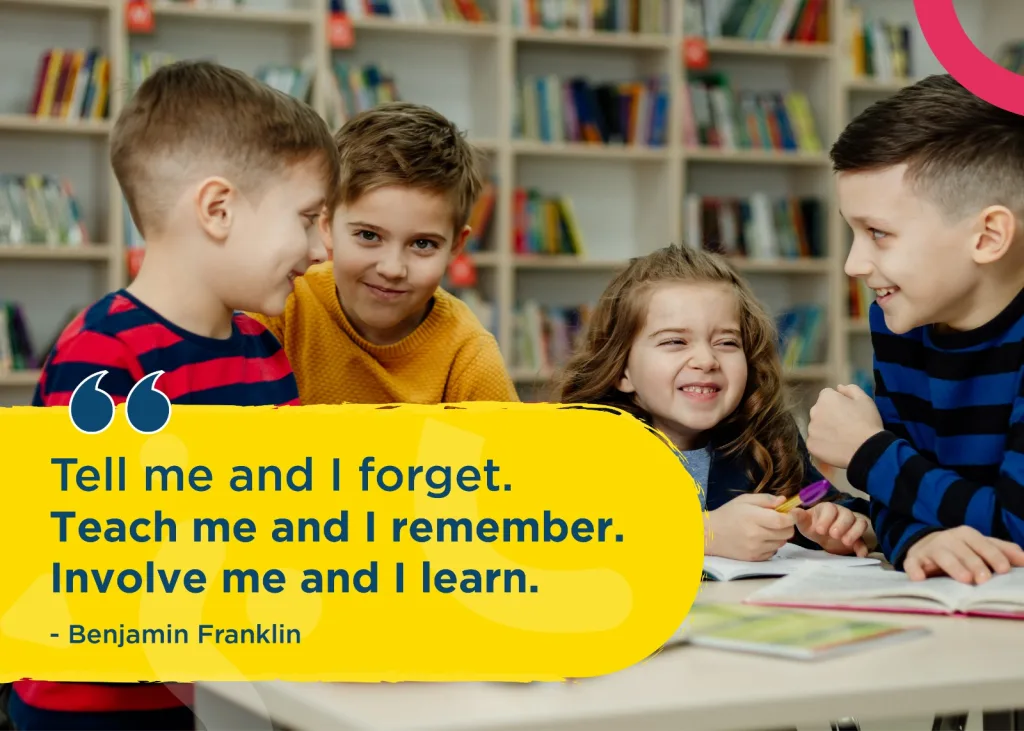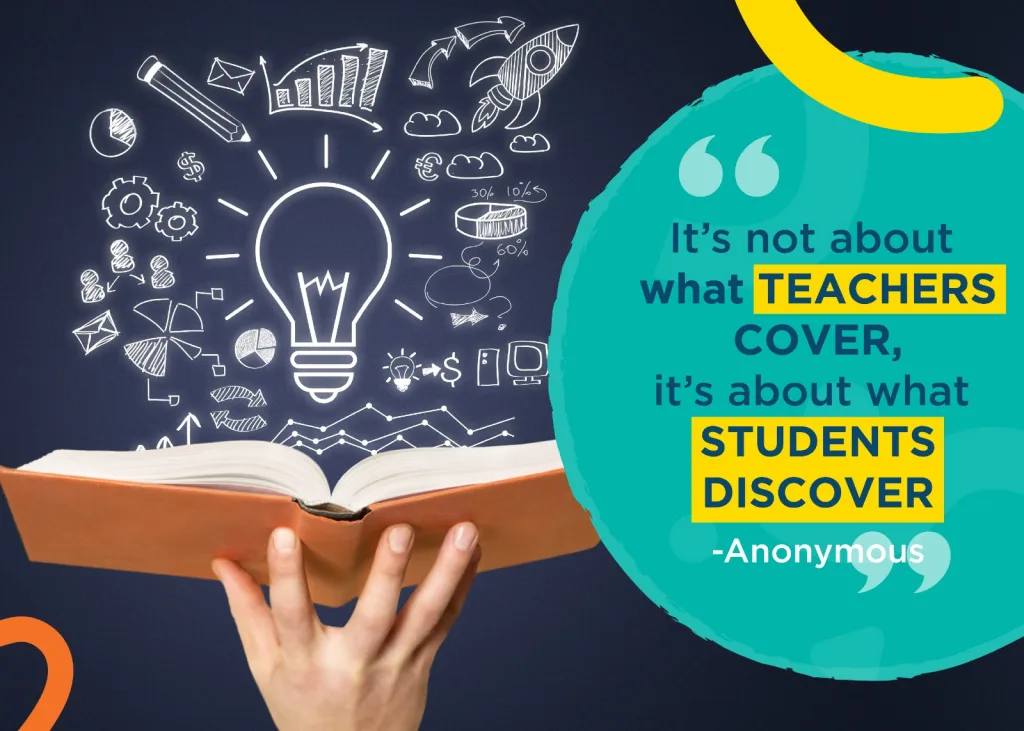No products in the cart.

In the rapidly evolving landscape of education and the emergence of new educational policies, school principals and teachers are giving their fullest efforts to prepare their students for a future that is ever-changing. As principals and teachers, your vision for your institution should go beyond producing mere test-takers; your teaching-learning process should aim to develop students' critical thinking, problem-solving, and help them achieve conceptual understanding. In this pursuit, project-based learning emerges as a transformative approach that not only engages students but also cultivates their creativity, resilience, and deep understanding of concepts.
In this blog, we will explore why project-based learning should be a top priority for schools especially in EdTech, and how this blend of all other learning processes empowers your students to thrive in the complex world they will inherit.
How Project-Based Learning is instrumental in education:

Project-based learning is an instructional approach designed to give teachers the ability to guide students in developing knowledge and skills through engaging learning projects set around concept based challenges and problems they may face in the real world. It also abides by the NEP 2020 guideline of focusing more on hands-on learning as it reinforces students’ conceptual understanding with the notion that they can break down future problems into their component parts, and find optimal ways to derive solutions.
Project based learning relies on gaining knowledge based on experience, helping teachers give students an integrated learning experience based on different teaching methods.
How project based learning benefits students in attaining conceptual understanding:
Being a learning style that integrates many other learning methods, project based learning places students in an active learning environment, giving them conceptual clarity as they evaluate and solve problems presented to them. Coordination and collaboration with teachers and students boosts their overall conceptual knowledge through sharing of different perspectives and deepens their own understanding of the subject matter. Providing a holistic learning approach with project based learning strengthens students’ learning capabilities helping them achieve concept mastery.
Why your school should provide project based learning:
Research confirms that project based learning can help in successful classroom learning in today’s rapidly changing and complex world, by developing a broader set of knowledge and skills in a school’s curriculum as well as improving academic achievement. With the growing adoption of the project based learning technique, here’s why schools should adopt this learning practice at the earliest.
1. Real-world relevance:
Today's school's main aim is to make their schools NEP ready, enabling their students with the capabilities to effectively deal with real-world projects and problems. This helps teachers see the relevance of their teachings in practical situations. By working on concept based projects, students develop a deeper understanding of concepts and skills that go beyond rote memorization.
2. Active learning:
Project based learning promotes the active exchange of conceptual information and knowledge in a classroom by involving students and teachers in an inquiry-based, hands-on learning journey. Instead of passively receiving information, students actively explore, investigate, and construct their own conceptual understanding of information.
3. Critical thinking and problem-solving:
Teachers create a school learning environment for students in such a way that they analyse, evaluate, and solve complex problems, training and enabling them to succeed in future endeavors.
4. Improved curriculum:
With the emphasis for formative curriculum implementation in schools, the application of the project based learning method can help elevate school curricula and put schools a step ahead in the education industry.
5. Skills for the future:
Project based learning equips students with essential 21st century learning skills, such as critical thinking, creativity, communication, and problem-solving. Integrating these skills into the curriculum design in schools is highly valued in today's rapidly changing world, as they give students conceptual understanding of content and are key ingredients in making a school’s education process stand out among competitors.

Role of teachers in project based learning:
A teacher's role in project based learning is unique and formative. An educator’s ability to transition from the role of instructor to one of a mentor or collaborator is an important factor when it comes to implementing learning methods efficiently. As per the NEP 2020, teachers need to use projects to enhance deeper learning so that students can acquire information and apply concepts and ideas. Any learning method can only be implemented well if it is taught effectively.
1. Solving collaboration problems:
Teachers foster teamwork and cooperation in students. Any problems that arise during a learning project need to be effectively solved by the teachers. Ensuring the equal participation of students in a classroom learning project is the main responsibility that a teacher takes upon themselves. It is only through effective classroom management that students can achieve conceptual understanding.
2. Counter lack of engagement:
Teachers, as guides, need to set students on a formative path in education through effective learning methods, helping them overcome reluctance in learning and find optimal solutions to given challenges.
3. Bridge gaps in learning: With the increasing use of technology in classrooms, teachers must implement the project based learning method in classrooms to counter the gaps in learning caused by traditional teaching methods, overcoming the illusion that passive learning is required in education. Project based learning in a classroom also helps teachers make classes more engaging and lively, increasing student engagement.
4. Effective evaluation: It is difficult to evaluate a learner’s conceptual understanding through theoretical knowledge, as this method mostly relies on rote memorization. Using the project based learning method, teachers can effectively analyze students’ conceptual clarity and understanding of subject matter taught in class, as well as measure their academic potential based on their critical skills.

Why project based learning is important in education:
Overall, project-based learning provides a holistic and engaging approach to learning that helps teachers promote conceptual understanding by integrating theoretical knowledge with practical application, while fostering critical thinking and problem solving skills in students. It encourages students to take ownership of their learning, leading to a deeper understanding and long-term retention of the concepts that are studied. Project based learning evidently helps prepare students for the challenges of the future and cultivates lifelong learners equipped with 21st century skills, capable of adapting to a rapidly changing world.
In the rapidly evolving landscape of education and the emergence of new educational policies, school principals and teachers are giving their fullest efforts to prepare their students for a future that is ever-changing. As principals and teachers, your vision for your institution should go beyond producing mere test-takers; your teaching-learning process should aim to develop students' critical thinking, problem-solving, and help them achieve conceptual understanding. In this pursuit, project-based learning emerges as a transformative approach that not only engages students but also cultivates their creativity, resilience, and deep understanding of concepts.
In this blog, we will explore why project-based learning should be a top priority for schools especially in EdTech, and how this blend of all other learning processes empowers your students to thrive in the complex world they will inherit.
How Project-Based Learning is instrumental in education:

Project-based learning is an instructional approach designed to give teachers the ability to guide students in developing knowledge and skills through engaging learning projects set around concept based challenges and problems they may face in the real world. It also abides by the NEP 2020 guideline of focusing more on hands-on learning as it reinforces students’ conceptual understanding with the notion that they can break down future problems into their component parts, and find optimal ways to derive solutions.
Project based learning relies on gaining knowledge based on experience, helping teachers give students an integrated learning experience based on different teaching methods.
How project based learning benefits students in attaining conceptual understanding:
Being a learning style that integrates many other learning methods, project based learning places students in an active learning environment, giving them conceptual clarity as they evaluate and solve problems presented to them. Coordination and collaboration with teachers and students boosts their overall conceptual knowledge through sharing of different perspectives and deepens their own understanding of the subject matter. Providing a holistic learning approach with project based learning strengthens students’ learning capabilities helping them achieve concept mastery.
Why your school should provide project based learning:
Research confirms that project based learning can help in successful classroom learning in today’s rapidly changing and complex world, by developing a broader set of knowledge and skills in a school’s curriculum as well as improving academic achievement. With the growing adoption of the project based learning technique, here’s why schools should adopt this learning practice at the earliest.
1. Real-world relevance:
Today's school's main aim is to make their schools NEP ready, enabling their students with the capabilities to effectively deal with real-world projects and problems. This helps teachers see the relevance of their teachings in practical situations. By working on concept based projects, students develop a deeper understanding of concepts and skills that go beyond rote memorization.
2. Active learning:
Project based learning promotes the active exchange of conceptual information and knowledge in a classroom by involving students and teachers in an inquiry-based, hands-on learning journey. Instead of passively receiving information, students actively explore, investigate, and construct their own conceptual understanding of information.
3. Critical thinking and problem-solving:
Teachers create a school learning environment for students in such a way that they analyse, evaluate, and solve complex problems, training and enabling them to succeed in future endeavors.
4. Improved curriculum:
With the emphasis for formative curriculum implementation in schools, the application of the project based learning method can help elevate school curricula and put schools a step ahead in the education industry.
5. Skills for the future:
Project based learning equips students with essential 21st century learning skills, such as critical thinking, creativity, communication, and problem-solving. Integrating these skills into the curriculum design in schools is highly valued in today's rapidly changing world, as they give students conceptual understanding of content and are key ingredients in making a school’s education process stand out among competitors.

Role of teachers in project based learning:
A teacher's role in project based learning is unique and formative. An educator’s ability to transition from the role of instructor to one of a mentor or collaborator is an important factor when it comes to implementing learning methods efficiently. As per the NEP 2020, teachers need to use projects to enhance deeper learning so that students can acquire information and apply concepts and ideas. Any learning method can only be implemented well if it is taught effectively.
1. Solving collaboration problems:
Teachers foster teamwork and cooperation in students. Any problems that arise during a learning project need to be effectively solved by the teachers. Ensuring the equal participation of students in a classroom learning project is the main responsibility that a teacher takes upon themselves. It is only through effective classroom management that students can achieve conceptual understanding.
2. Counter lack of engagement:
Teachers, as guides, need to set students on a formative path in education through effective learning methods, helping them overcome reluctance in learning and find optimal solutions to given challenges.
3. Bridge gaps in learning: With the increasing use of technology in classrooms, teachers must implement the project based learning method in classrooms to counter the gaps in learning caused by traditional teaching methods, overcoming the illusion that passive learning is required in education. Project based learning in a classroom also helps teachers make classes more engaging and lively, increasing student engagement.
4. Effective evaluation: It is difficult to evaluate a learner’s conceptual understanding through theoretical knowledge, as this method mostly relies on rote memorization. Using the project based learning method, teachers can effectively analyze students’ conceptual clarity and understanding of subject matter taught in class, as well as measure their academic potential based on their critical skills.

Why project based learning is important in education:
Overall, project-based learning provides a holistic and engaging approach to learning that helps teachers promote conceptual understanding by integrating theoretical knowledge with practical application, while fostering critical thinking and problem solving skills in students. It encourages students to take ownership of their learning, leading to a deeper understanding and long-term retention of the concepts that are studied. Project based learning evidently helps prepare students for the challenges of the future and cultivates lifelong learners equipped with 21st century skills, capable of adapting to a rapidly changing world.
